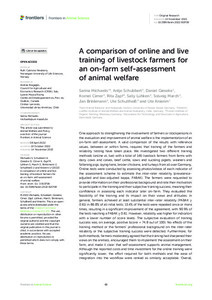| dcterms.abstract | One approach to strengthening the involvement of farmers or stockpersons in the evaluation and improvement of animal welfare is the implementation of an on-farm self-assessment. A valid comparison of the results with reference values, between or within farms, requires that training of the farmers and reliability testing have taken place. We investigated two different training methods (online vs. live) with a total of 146 livestock farmers from farms with dairy cows and calves, beef cattle, sows and suckling piglets, weaners and fattening pigs, laying hens, broiler chickens, and turkeys from all over Germany. Online tests were conducted by assessing photos/videos of each indicator of the assessment scheme to estimate the inter-rater reliability (prevalence-adjusted and bias-adjusted kappa, PABAK). The farmers were requested to provide information on their professional background and rate their motivation to participate in the training and their subjective training success, meaning their confidence in assessing each indicator later on-farm. They evaluated the feasibility of the training and its impact on their views and attitudes. In general, farmers achieved at least substantial inter-rater reliability (PABAK ≥ 0.61) in 86.8% of all initial tests; 13.4% of the tests were repeated once or more times, resulting in a significant improvement of the agreement, with 90.9% of the tests reaching a PABAK ≥ 0.61. However, reliability was higher for indicators with a lower number of score levels. The subjective evaluation of training success was, on average, positive (score = 74.8 out of 100). No effects of the training method or the farmers’ professional background on the inter-rater reliability or the subjective training success were detected. Furthermore, for both methods, farmers moderately agreed that the training had sharpened their views on the animals, encouraged them to implement the assessment on their farm, and made it clear that self-assessment supports animal management. Although the reported costs and time investment for the online training were significantly lower, the effort required for both methods and the ease of integration into the workflow were ranked as similarly acceptable. Overall, both training methods appear feasible for the training of farmers/stockpersons on the assessment of animal-based indicators. | eng |


